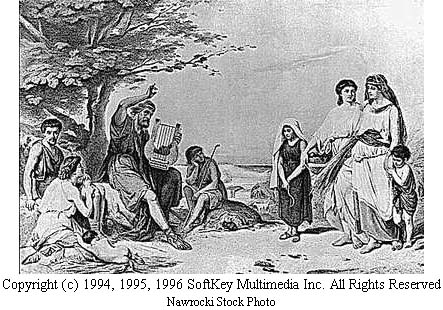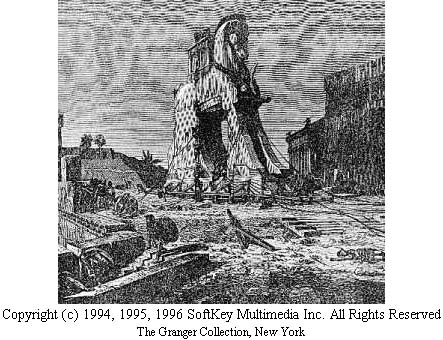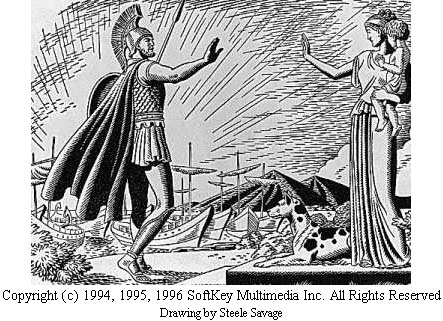|
|
|
Amazon.com International Sites :
USA, United Kingdom, Germany, France
Books about Homeric Legend :
Apart from the historical writings of ancient Israel, the two major pieces of epic literature in Western civilization
are the 'Iliad' and the 'Odyssey', two books ascribed to the ancient Greek poet Homer. These two works represent
a brilliant retelling of myths and legends. For the Greeks of the 7th century BC, however, these books were their
history. Their past had been obliterated by the destruction of Mycenaean Civilization (see Greece,
Ancient). The tales that came down to the Greeks from Homer and other storytellers were regarded by them as
authentic narratives of a past they could not otherwise recover.
The individual who has traditionally been credited with putting the ancient Greek legends into writing is Homer.
About him nothing certain is known. The later historian Herodotus (5th century BC) said that Homer was a Greek
from Ionia on the west coast of Asia Minor. He was perhaps a native of the island of Chios and supposedly lived
around 850 BC. Other historians place him closer to 750 BC.

Homer sang the tales of Troy and of the voyage of Odysseus to the Greeks before the stories were written down in poetic form. --Nawrocki Stock Photo
Tradition depicts Homer as a blind minstrel wandering from place to place reciting poems that had come down to
him from a very old oral tradition. Many scholars believe that the books as they exist today were not written by
a single person and were not put in writing until centuries after they took their present form. It is probable
that much of the epic tradition of the two books was formed in the 200 or 300 years before an alphabet reached
Greece in the 9th or 8th century BC. If so, it is possible that Homer used earlier writings to help him, or he
could have dictated his poems to someone else because of his blindness or because he was illiterate.
The 'Iliad' is a summary in verse of what was apparently a very long war conducted against Troy by the Greeks.
As in much myth, there is a kernel of reality behind it. That there was such a war is quite likely. It would have
made sense for predecessors of the ancient Greeks to conduct a war against the city in order to gain control of
the Dardanelles, the water passage between the Mediterranean and Black seas. Had Troy, located near this waterway,
been a hostile power, the destruction of it might have enabled the Greeks to colonize the west coast of Asia Minor.
The war probably took place sometime between 1250 and 1185 BC.
For many centuries it was believed that the 'Iliad' was a piece of imaginative and inventive fiction. In 1870,
however, the German scholar Heinrich Schliemann began excavations at the place where Troy was believed to have
stood.
He satisfied himself, and eventually the rest of the world, that there had actually been a war fought there. The
excavations revealed that several cities had stood on the spot before the one Homer celebrated. (See also Schliemann.)
Altogether, Schliemann and his successors found the ruins of nine cities built atop one another over a period of
3,500 years. Homer's Troy was the seventh city. Ruins of its great walls, 16 feet (5 meters) thick, and flanking
towers still remained.
The 'Iliad' is an amazing tale of heroes and heroines, gods and goddesses. But most of all it is the story of
Achilles, of his anger and determination, and of his slaying of the Trojan hero Hector.
The purpose of the war was to recover the most beautiful woman in the world, Helen. She was the wife of Menelaus,
king of Sparta. But she had been carried off to Troy by Paris, son of King Priam of Troy. Menelaus, naturally,
swore vengeance. He called upon the kings and princes of Greece to help him. Among those who responded were Achilles,
Ajax, Diomedes, Odysseus, and Nestor. Agamemnon, king of Mycenae and brother of Menelaus, was chosen commander
in chief.
After two years of preparation, the Greek fleet of more than 1,000 ships and an army of 100,000 men assembled at
the port of Aulis in northeastern Greece. Hence the saying that Helen had the face that launched 1,000 ships.
The fleet was detained at Aulis by a calm sea. Seeking the reason for the delay, they were told by a soothsayer
that Agamemnon had killed a stag sacred to the goddess Artemis (or Diana). The wrath of the goddess could only
be appeased by the sacrifice of the offender's daughter.
Agamemnon was forced to consent. His daughter Iphigenia was led to an altar. The goddess relented at the last minute
and snatched Iphigenia away, leaving a deer in her place. Iphigenia became a priestess in the temple of Artemis
at Tauris.
With the anger of Artemis appeased, the wind proved favorable and the fleet set sail. They arrived to find the
Trojans well prepared. King Priam was too old to fight. He had assembled supplies for a long siege, however, and
formed alliances with neighboring princes and chieftains. The city was also protected by impenetrable walls. Its
defenders included Hector, Aeneas (of whom the Roman poet Virgil wrote much later), Sarpedon, and other warriors.
For more than nine years the Greeks besieged Troy unsuccessfully. Then Achilles quarreled with Agamemnon and refused
to take further part in the conflict. It was the slaying of his friend Patroclus about two thirds of the way through
the book that brought Achilles back to the action. He killed Hector in battle, but later he was himself killed--driving
the Greeks to despair of ever winning.

The monumental wooden horse was cleverly devised by Odysseus as a means of getting Greek warriors into Troy. --The Granger Collection, New York
It was then that the crafty Odysseus stepped forward with a stratagem. Aided by the goddess Athena, he planned
the construction of a huge wooden horse with enough room to contain 100 warriors. Secretly the best warriors were
hidden inside. Then the rest of the Greeks boarded ship as though to sail home in defeat. The Trojans thought the
horse was a peace offering to Athena. One of the Trojan priests, Laocoon, warned against "Greeks, even bearing
gifts." Cassandra, daughter of King Priam, also predicted disaster. She had been given the gift of prophecy
but had then been cursed--her prophecies, though always true, would never be believed. Their warnings were shouted
down, and a breach in the wall was made to allow the horse to be dragged in.
As the Trojans slept that night, the Greek warriors emerged and signaled the waiting ships to bring back the rest
of the Greeks to Troy. Soon thousands of Greeks were swarming into the city. By morning only a mass of ruins remained.
Nearly all the inhabitants were slain. Helen returned to her husband, and the Greeks sailed for home. The one whose
voyage home took the longest was Odysseus. The adventures of his return trip were told in the second Homeric epic.

Odysseus bids farewell to his wife Penelope and infant son Telemachus, as his faithful dog Argos lies nearby. --Drawing by Steele Savage
Odysseus, who was later called Ulysses by the Romans, was king of Ithaca, a small island on the west coast of
Greece. When summoned to join his fellow chieftains in the war against Troy, he could not bear to leave his young
wife, Penelope, and their son, Telemachus. He therefore pretended to be insane. To convince everyone of his madness,
he plowed the sand along the seashore as though it were a field. But Prince Palamedes, who came for him, recognized
this as a trick. To prove it, Palamedes placed little Telemachus in the path of the plow. When Odysseus quickly
turned the plow aside to avoid striking his son, all saw that his madness was a pretense. So Odysseus fitted 12
ships and went to Troy.
By the war's end he had been away from home for ten years. He filled his ships with treasure taken from the Trojans
and set sail. Ordinarily the trip from Troy to Ithaca would have taken only a short time. The Greek gods, however,
decided that it should take Odysseus ten years to reach his wife and son. During those years he and his men endured
a series of hazardous and remarkable adventures.
Soon after leaving Troy the ships ran into a raging storm. For nine days the winds drove the ships past Ithaca
and far off course. On the tenth day they reached the island of the Lotus-Eaters. When a party of men went ashore,
they ate of the lotus plants. This magic food made them forget all longing for home. Odysseus had them dragged
back to the ships, and again they set sail. They arrived at the island of the Cyclopes, a race of fierce one-eyed
giants (see Cyclops). Odysseus set out with 12 men to explore the island. They entered
the cave of Polyphemus, the most ferocious of the Cyclopes. He kept them prisoners and devoured six of the men.
While the giant slept, Odysseus stole his staff and sharpened it. With this weapon, heated red-hot, he burned out
the giant's eye. Odysseus and his men escaped by tying themselves to the bellies of some sheep let out to pasture.
Their next stop was at the Aeolian Isle, a peaceful land where Aeolus, Keeper of the Winds, lived. When they left
after a month of relaxation, Aeolus gave them a favorable wind to speed them on their way. The other winds he bound
into a leather bag and put on board Odysseus' ship.
The ships sailed smoothly for nine days until Ithaca was in sight. While Odysseus was sleeping his men determined
to open the leather bag because they believed it was filled with gold. Upon doing so, the winds were released.
They drove the ships back to the Aeolian Isle. This time, however, they were not welcomed. Aeolus believed that
men so unlucky must be hated by the gods.
A week later the ships beached at the island of the Laestrygones, a country of cannibals. Huge men hurled rocks
and destroyed 11 of the ships. The crews of all 11 ships perished. Only Odysseus and his ship's crew survived to
continue their journey.
Their next stopping place was the island home of Circe, the enchantress. She cast a spell on Odysseus' men, changing
them into swine. Odysseus himself was protected by an herb given to him by Hermes, messenger of the gods. When
Circe realized he was protected by Hermes, she changed the swine back into men and prevailed upon them all to remain
for a year at her palace.
When they decided to leave, she said they must first journey to Hades, the dwelling place of the dead. When they
reached Hades, Odysseus met many of his departed comrades, including Achilles. He and his companions were told
that many perils still awaited them. There was a chance of reaching home. If they were to do so, however, they
must curb their greed when they came to the place where the sun-god Helios pastured his herds. If a single beast
were harmed, they would all be doomed.
As they continued their journey, they were forced to sail past the dwelling place of the Sirens, sea nymphs whose
singing lured men to certain death. To prevent this from happening, Odysseus had his men put wax in their ears.
He had himself tied to the mast so he could listen to the singing.
Once this danger was bypassed, a more ominous one lay ahead. The ship had to sail between Scylla and Charybdis.
On one side of a narrow strait Charybdis pulled everything nearby into a vast whirlpool. On the other side Scylla,
a six-headed monster, waited to devour anyone who passed by. The ship succeeded in getting through with a burst
of speed but not before losing six sailors to the jaws of Scylla.
Those who survived reached the pleasant Isle of the Sun, where Helios pastured his animals. Odysseus wished to
sail past it, but the men feared the night seas. They disembarked and were held there for a month by strong winds.
As their food supply ran out, the sailors decided they had to kill one of the animals. While Odysseus slept they
did so. They were able to sail away without problems, leading them to think they had escaped the wrath of Helios.
But Zeus, highest of the gods, replied to the sun-god's request for vengeance by sending a hurricane. It destroyed
the ship and crew, leaving Odysseus alone in the sea, clinging to the mast. Ten days later he was carried ashore
on the island of Calypso. She kept him prisoner for seven years before he was released through the aid of Athena
and Hermes. He made a raft, and after a series of other adventures he finally reached Ithaca.
His problems were not over. He had been gone for 20 years, and no one believed he could still be alive. It was
dangerous for him to make himself known because several men were waiting to wed Penelope and gain the kingship.
Athena changed Odysseus' appearance and hid in a cave his treasure that he had brought with him from his last stopping
place.
Penelope's suitors were staying at the palace, wasting the kingdom's wealth and trying to make the queen choose
among them. Telemachus, the son and heir to the throne, had grown up and spent his time vainly trying to rid the
palace of the suitors. Penelope herself put them off by a ruse. She insisted she could not marry anyone until she
had finished weaving a shroud for Laertes, the aged father of Odysseus, who was near death. What she wove by day
she unraveled each night, so the cloth was never finished. Servants finally gave away her secret to the suitors,
however, and they hounded her for an answer.
Odysseus meanwhile found shelter in the hut of his former swineherd. There Telemachus appeared, having escaped
the plan of the suitors to kill him. Odysseus revealed himself to his son, and together they plotted what they
would do. Telemachus returned to the palace, bringing along Odysseus disguised as a beggar. No one recognized Odysseus
except his nurse and his aged dog Argos, but the animal was too weak and soon died.
Penelope did not recognize her husband, but she made him welcome and prepared a room for him. She had by this time
decided finally to choose one of the suitors. She decided to make the choice on the basis of a contest among them.
The next evening she brought out the great bow Odysseus had left at home, along with its quiver full of arrows.
She announced she would marry the man who could drive an arrow through holes in the blades of 12 axes set in a
row.
Many tried, but none could even bend the bow. Odysseus, still clothed as a beggar, stepped forward and asked to
test his strength. The suitors thought the idea ridiculous, but Telemachus gave him the bow. Snatching an arrow,
he sent it flying straight through the 12 axe blades. After Odysseus had shown who he was, he and Telemachus killed
all the suitors. The kingdom of Ithaca was restored to him.
Although set within the circumstances of the Trojan War, the 'Odyssey' is a far different book. With the 'Iliad',
from the book itself as well as the archaeological excavations that support it, it is reasonable to infer a real
historical event as background. With the 'Odyssey' such an assumption is impossible.
The book is a tale of adventure at sea and of homecoming after a long absence. These two themes have pervaded Western
literature ever since the Homeric epic was written, and the story may well have proved a popular one well before
Greek history began. The story could just as well have stood on its own without any relation to the conflict of
the Greeks with Troy.
The vividly fictional characteristics of the story have not prevented critics, past and present, from seeking to
place it in a specific geographic context. Hesiod, who wrote later than Homer, believed that Odysseus and his ships
sailed around in the general area of Italy and Sicily, to the west of Ithaca. Later analysts tried to set the wanderings
within the Mediterranean Sea generally, while others suggested the Atlantic Ocean as more likely.
The ancient astronomer Eratosthenes (2nd century BC) regarded all such speculations as foolish. For him the world
of Odysseus was a completely imaginary one. Indications of this are found within the text itself. Some of the hero's
wanderings could well have been based on the even older story of Jason and his Argonauts, who sailed east in search
of the golden fleece. It is quite likely that several ancient legends were woven into one continuous epic.
Amazon.com International Sites :